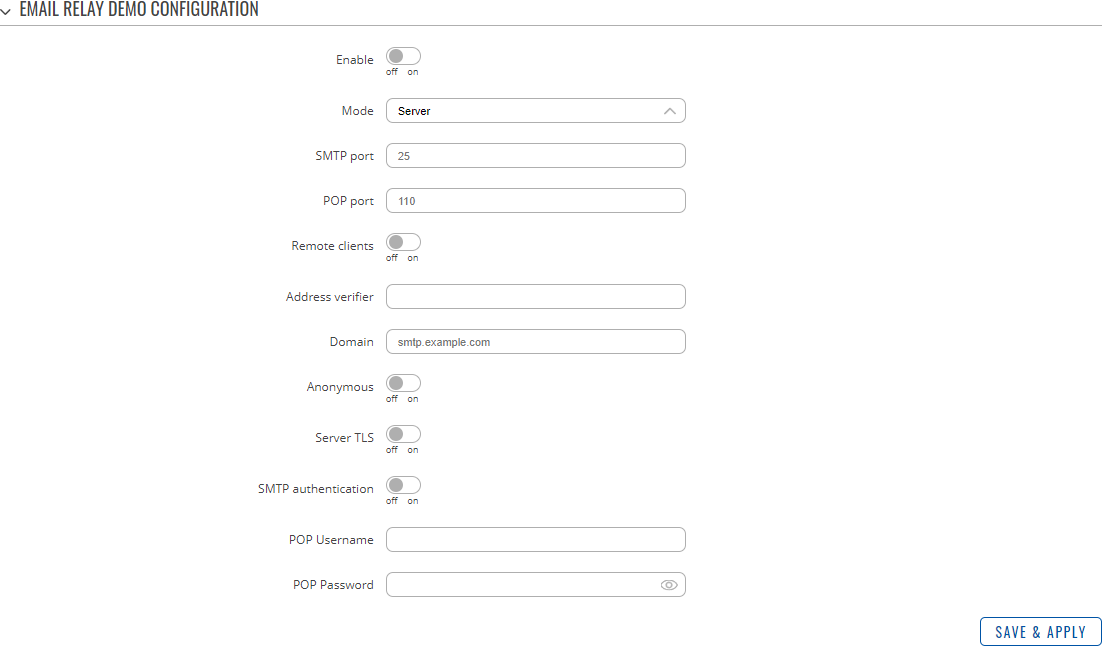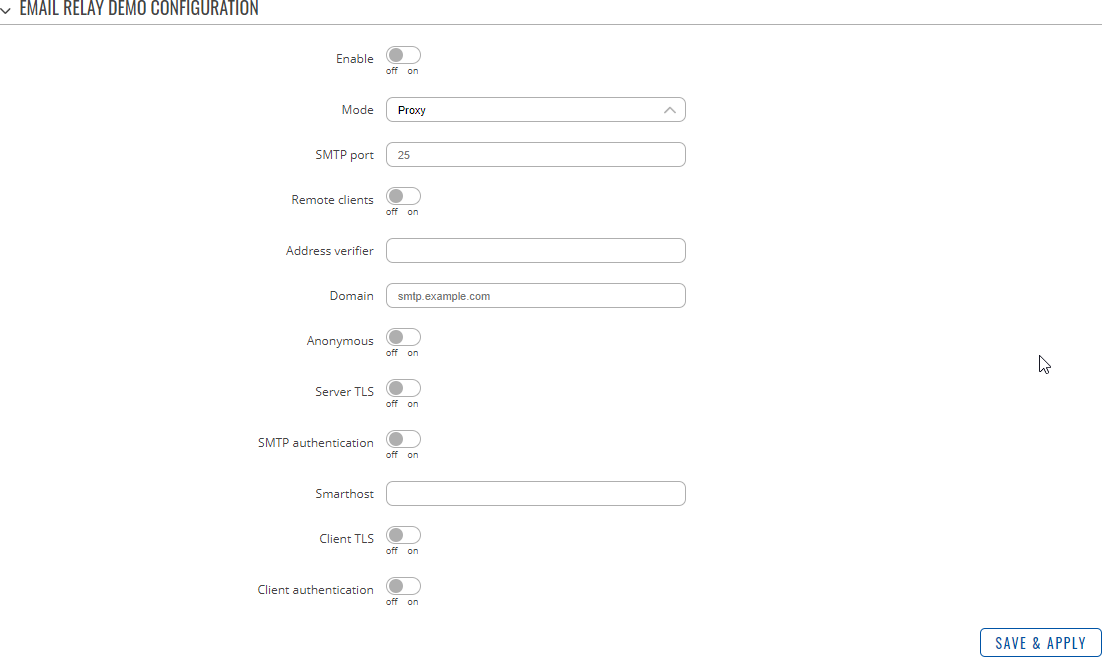RUT230 Email Relay: Difference between revisions
Gytispieze (talk | contribs) Created page with "{{Template: Networking_rutos_manual_email_relay <!------------------------DEVICE-----------------------> | name = RUT230 | series = RUT2 <!----------------------SEPA..." |
No edit summary |
||
| Line 1: | Line 1: | ||
{{Template: | {{Template: Networking_rutos_manual_email_relay_rut2_rut9 | ||
<!------------------------DEVICE-----------------------> | <!------------------------DEVICE-----------------------> | ||
| name = RUT230 | | name = RUT230 | ||
Latest revision as of 15:00, 8 April 2024
Main Page > EOL Products > RUT230 > RUT230 Manual > RUT230 WebUI > RUT230 Services section > RUT230 Email RelayThe information in this page is updated in accordance with firmware version RUT2_R_00.07.03.4.
Notice: This device has entered it's EOL (End of Life) cycle. For more information, visit our EOL policy here. Temporarily, some content in this page might not match features found in firmware listed above.
Summary
Email Relay is an e-mail store-and-forward message transfer agent and proxy server. The service does three things:
- Stores any incoming e-mail messages that it receives
- Forwards e-mail messages on to another remote e-mail server
- Serves up stored e-mail messages to local e-mail reader programs
More technically, it acts as a SMTP storage daemon, a SMTP forwarding agent, and a POP3 server.
This manual page provides an overview of the Email Relay functionality in RUT230 devices.
Note: Email Relay is additional software that can be installed from the System → Package Manager page.
Email Relay Configuration
This section displays Email Relays that are currently configured on the router. By default the list is empty. To add a new email relay, enter instance name, choose service mode and press 'Add'.
Server
| Field | Value | Description |
|---|---|---|
| Enable | off | on; default: off | Enables this email relay instance. |
| Mode | Server | Proxy | Command line; default: Server | Instance mode. |
| SMTP port | integer [1..65535]; default: none | SMTP Port to listen incoming connections. |
| POP port | integer [1..65535]; default: none | POP Port to listen incoming connections. |
| Remote clients | off | on; default: off | To allow connections from anywhere. By default only local allowed. |
| Address verifier | string; default: none | Runs the specified external program to verify a message recipient's e-mail address. |
| Domain | domain name; default: none | Specifies the network name that is used in SMTP EHLO. The default is derived from a DNS lookup of the local hostname. |
| Anonymous | off | on; default: off | Disables the server's SMTP VRFY command. |
| Server TLS | off | on; default: off | Enables TLS for incoming SMTP and POP connections. |
| TLS certificate | .pem certificate; default: none | Specifies a PEM-format file containing a X.509 certificate and private key. |
| SMTP authentication | off | on; default: off | Enables SMTP server authentication of remote SMTP clients. |
| SMTP Username | string; default: none | Username for authentication with the SMTP server. |
| SMTP Password | string; default: none | Password for authentication with the SMTP server. |
| POP Username | string; default: none | Username for authentication with the POP server. |
| POP Password | string; default: none | Password for authentication with the POP server. |
Proxy
| Field | Value | Description |
|---|---|---|
| Enable | off | on; default: off | Enables this email relay instance. |
| Mode | Server | Proxy | Command line; default: Server | Instance mode. |
| SMTP port | integer [1..65535]; default: none | SMTP Port to listen incoming connections. |
| Remote clients | off | on; default: off | To allow connections from anywhere. By default only local allowed. |
| Address verifier | string; default: none | Runs the specified external program to verify a message recipient's e-mail address. |
| Domain | domain name; default: none | Specifies the network name that is used in SMTP EHLO. The default is derived from a DNS lookup of the local hostname. |
| Anonymous | off | on; default: off | Disables the server's SMTP VRFY command. |
| Server TLS | off | on; default: off | Enables TLS for incoming SMTP and POP connections. |
| TLS certificate | .pem certificate; default: none | Specifies a PEM-format file containing a X.509 certificate and private key. |
| SMTP authentication | off | on; default: off | Enables SMTP server authentication of remote SMTP clients. |
| SMTP Username | string; default: none | Username for authentication with the SMTP server. |
| SMTP Password | string; default: none | Password for authentication with the SMTP server. |
| Smarthost | ip:port | domain name:port; default: none | Specify the SMTP to forward emails. |
| Client TLS | off | on; default: off | Enables negotiated TLS for outgoing SMTP connections. |
| Client authentication | off | on; default: off | Enables SMTP client authentication with the remote server. |
| Username | string; default: none | Username for authentication with the remote server. |
| Password | string; default: none | Password for authentication with the remote server. |
Command line
| Field | Value | Description |
|---|---|---|
| Enable | off | on; default: off | Enables this email relay instance. |
| Extra command line | string; default: none | Extra command line options. |




